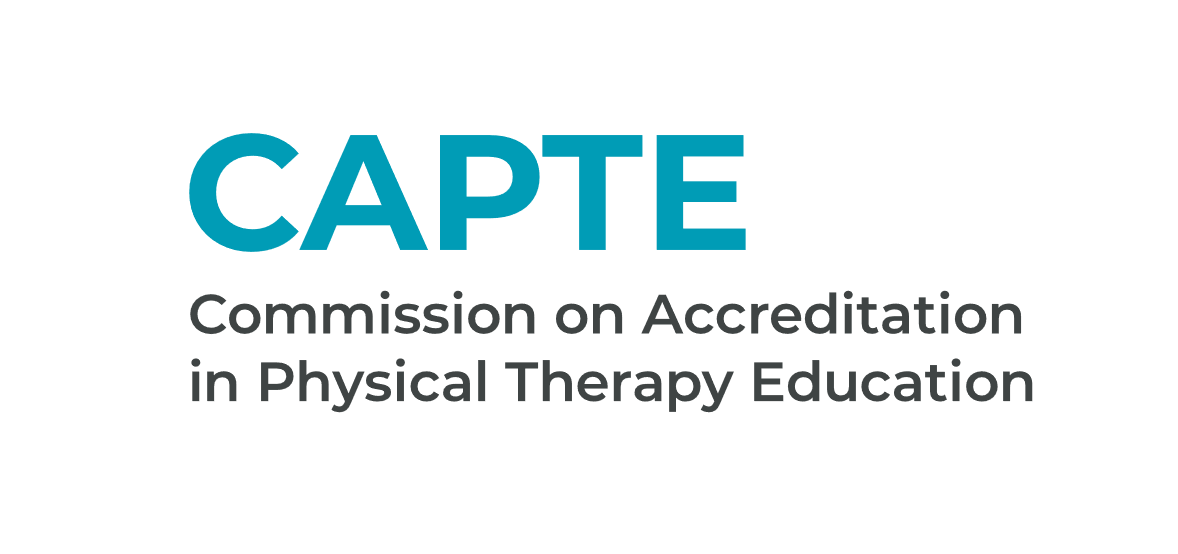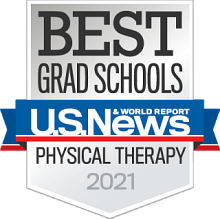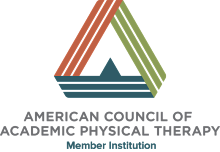
Frequently Asked Questions
The expected outcome of a Doctorate degree in Physical Therapy is an entry-level professional position. Once students complete a DPT program, they are required to pass a licensure exam in order to practice as Physical Therapists. Current information can be found on our Graduates webpage that includes graduation pass rates, high pass rate, and employment outcomes.
To schedule an appointment, visit our admissions counseling page.
You may also email your specific questions or concerns to ptadmissions@hsc.utah.edu. Sending an email will guarantee the fastest response time.
Students needing general university advising for general education or bachelor degree requirements should contact Academic Advising Center at 801-581-8146 or visit their website.
The "best" major is in any area in which the student would enjoy working after receiving their undergraduate degree and should be selected based on the student's interests. The DPT Program does not have a preference as to the major for the baccalaureate degree as long as prerequisite courses are completed. However, a potential major that does include most of the prerequisite courses is either an exercise science or exercise physiology major.
Please visit our Prerequisite Page for up to date details on requirements and prerequisite courses for admissions.
The minimum required cumulative and prerequisite courses grade point average is 3.00 on a 4.00 scale. The minimum grade point must be met at the time of application and maintained until admission.
Applicants apply to the DPT program at the University of Utah through PTCAS. PTCAS allows PT applicants to use a single Web-based application to apply to multiple PT programs.
A Completed PTCAS application includes the following:
- the standard PTCAS essay (also known as a personal statement)
- additional essay, specific to the UofU, Dept of PT, as indicated on PTCAS
- verification of PT observation hours
- three letters of recommendation (forms included with the application)
- official transcripts from all colleges attended
Further, if English is not the first language, an applicant must submit the results of the TOEFL examination. (If the internet-based test is taken the score must be at least 90.)
For further application instructions, click here.
PTCAS stands for Physical Therapy Centralized Application System. This online application is a service of the APTA and it allows applicants to use one online account to apply to multiple PT programs. To find out more about PTCAS, visit their website at: www.ptcas.org
No, the GRE is NOT required to apply to the DPT program
A good way for applicants to stand out is through the personal essay statement on PTCAS. Use the essay as an opportunity to help us get to know you. Letters of recommendation are also a great way for us to get to know you. Including all of your experiences (observation hours, extracurricular activities, employment history, volunteer work, and research activities) on your application even if they are not PT related is also a great way to stand out as an applicant.
Your PTCAS application must be marked complete by Midnight Eastern Time October 1.
Definitions of application status can be found in the FAQ portal of the PTCAS website. No application will be accepted past the October deadline. No reminder notices will be sent.
Yes, however, only applicants who are offered admission will be required to submit an application to the University of Utah Graduate School (supplemental application) using Slate. The deadline for this application will be sent with the admission offer.
For more details regarding application instructions, click here.
No, an interview is not required as part of our admissions process. Qualified applicants will be admitted based on application written review scores.
Yes, there are a few other admission requirements. Admission requirements differ from application requirements in that they are not submitted with the application. They are required for matriculation, once accepted into the program.
Additional admission requirements include:
- First Aid - must be the Basic Life Support (BLS) for Healthcare Providers 1 & 2-Rescuer CPR and AED for adult, child and infant. The skills practice and skills testing portion must be done in the classroom, NOT online.
- CPR Certification - must be from the American Heart Association (AHA). Certification from any provider will be accepted for First Aid (AHA, American Red Cross, etc.).
- Immunizations - Hepatitis B, MMR, Tdap, Varicella, Polio (optional), TB test, and Flu vaccine.
- Background check and drug screen
International students can meet with the International Student & Scholar Services (ISSS) office for further information regarding other additional admission requirements to the university. Please visit their website or call 801-581-8876.
No. The DPT is a clinical doctoral degree. Dissertations are most commonly associated with the research PhD degree.
Up to 147 students are accepted each year. For our residential pathways, up to 50 for SLC, 22 for St. George, and up to 75 for Hybrid. This is per CAPTE’s academic program requirements.
Students in each entering class will begin their course work in May (summer semester). Students will complete their course of study in nine continuous semesters (including two summers).
No. The curriculum is designed for completion on a full-time basis, as each semester builds on the courses of the previous semester. Each course is offered only once per year in sequence.
Yes, we do offer tours for prospective students. You must schedule a tour in advance. To schedule a tour, please email ptadmissions@hsc.utah.edu.
High school students should know that the educational preparation for this degree program is now only at the post-baccalaureate level. That means that students interested in a career in physical therapy need to obtain a baccalaureate degree before entering into a professional program, although some universities offer the professional program in conjunction with the baccalaureate degree. While in high school, students interested in PT should be encouraged to take courses in anatomy and physiology, if these courses are offered. Students interested in PT should also be encouraged to take courses in chemistry and physics. Competetive students will have a B grade or better in all prerequisite courses. Job shadowing while in high school is strongly encouraged.
Once in college, students should select a major based on their academic interests and not necessarily one labeled as pre-PT. For general career information as well as specific college prerequisite requirements and other admissions information students can access the professional organization website for physical therapists at www.apta.org.
Students who might be interested in a career in physical therapy but who don't want to pursue graduate studies may explore opportunities as physical therapist assistants. These people work directly with patients under the supervision of a physical therapist. A two-year degree from an accredited institution is required to be eligible to sit for the licensure examination; several colleges in Utah offer this degree. Interested students may obtain additional information by accessing the American Physical Therapy Association website.
APTA represents Physical Therapists, Physical Therapist Assistants, and Physical Therapy students throughout the United States. Among the Association's objectives are enhancement of Physical Therapy education, practice, and research; accreditation of Physical Therapy education programs; communication with members; improvement of minority participation and representation in the profession; quality assurance; professional development and continuing education; interaction with government agencies and legislative bodies; attention to reimbursement issues; and development and implementation of public awareness programs.
A doctoral degree allows the student to obtain a broad background in the liberal arts and provides time for students to integrate the significant amount of material included in a Physical Therapy curriculum. Also, for those who currently possess a bachelor's degree in another area, it is a logical choice to progress to a doctoral degree. Over the years, the volume of scientific technology and literature included in Physical Therapist education programs has grown well beyond what can be reasonably included in a baccalaureate degree program. APTA believes that a doctoral program more adequately prepares the graduate to meet the expectations of the profession and the health care needs of society.
APTA does not rank programs. Physical Therapy education programs are accredited by CAPTE, which assures quality in Physical Therapy education. Graduation from an accredited program is currently required for eligibility to sit for the licensure examination for Physical Therapists and Physical Therapist Assistants in those states in which licensure is required.
The decision to attend a Physical Therapy program is a very personal one that must be made on the basis of a variety of factors, including: geographic location and size of the school, cost, class size, faculty composition and cohesiveness (number of years working together, for example); degree awarded; and design and length of curriculum. In an effort to compare the above factors, you may wish to survey current students and recent graduates of the program and interview employers who hire graduates and ask about program strengths and weaknesses.
Department scholarships are only available to students once they have matriculated into the program. You can check out the financial aid information on the APTA website by visiting their page on Scholarships, Awards & Grants. Click here for more information regarding financial aid opportunities at the University of Utah.
Yes, the University of Utah is accredited by the Northwest Association of Schools and Colleges. The Doctor of Physical Therapy Program (all pathways) is also accredited by the Commission on Accreditation in Physical Therapy Education ( CAPTE) 1111 North Fairfax Street, Alexandria, Virginia 22314; telephone: 703-706-3245; email: accreditation@apta.org; website: http://www.capteonline.org.
Students who have a complaint against the University of Utah should first file a complaint with the institution.
Students, Center Coordinators of Clinical Education, Clinical Instructors, and the public who have complaints regarding the appropriateness of student preparation, clinical instruction, responses of the University to requests by either student or clinical site among others are taken seriously. If complaints are not handled appropriately or in a timely manner by the Director of Clinical Education (DCE), the Department Chair should be notified. If the DCE and Department Chair have not adequately addressed a situation that requires further attention, the Dean of the College of Health should be contacted. In the event that the issue remains unresolved, the Commission on Accreditation in Physical Therapy Education can be contacted at 703-706-3245.
Have a Question?
E-mail your specific questions to dptadmissions@hsc.utah.edu (Residential) OR hybrid.dptadmissions@hsc.utah.edu (Hybrid).
Related Links
Accreditation


Accolades & Affiliations

